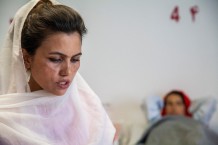In June 2003, EMERGENCY opened a Maternity Centre in Anabah, Afghanistan, to provide antenatal, gynaecological, obstetric, and neonatal care to the population of the Panjshir Valley and surrounding provinces. In 2015, the Maternity Centre underwent an expansion, with a new state-of-the-art wing improving its facilities and increasing the number of beds available. The Anabah Maternity Centre remains the only specialised and completely free facility of its kind in an area with a population of over 250,000 people. It is open 24/7 and works alongside our network of First Aid Posts and Primary Healthcare Centres spread throughout the Panjshir Valley and surrounding areas, to ensure as many people as possible have access to its services. In these facilities, our local medics provide crucial care to patients. When necessary, patients are stabilised and then transferred to EMERGENCY’s hospital facilities by our ambulance service, which operates 24/7. These clinics also ensure that patients and their new-born babies who travel to the Maternity Centre from outside Panjshir can receive continuity of care and follow-up examinations closer to home. EMERGENCY is committed to sustainable healthcare projects and building the capacity of Afghan medical professionals. The Anabah Maternity Centre provides theoretical and practical medical education, with many trainees continuing to work at the centre after graduating. The Maternity Centre is recognised by the Afghan Ministry of Health as a national training centre for specialisation in paediatrics and gynaecology, and we are continually training both male and female doctors in these specialisations.
The Maternity Centre has been open and fully operational throughout the numerous phases of the conflict since its opening. The hospital treated patients during the extremely volatile summer of 2021, culminating with the collapse of the Afghan government in August of that year. It remains open and committed to continuing operations uninterrupted.





















